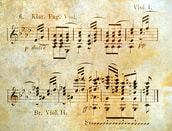 One fantastic thing about teaching is finding out how your mind works - what makes you tick, what gets you frustrated, how you measure success - it's different across each and every student. Some students have one thing in common though, the desire to understand the logic and reasoning behind the process of learning a piece of music. What a great thing to aspire to! As they say, knowledge is power. However, there's a potential trap in searching for the logic. Often when we're learning a piece of music, we're doing so with the aid of a visual instruction, like sheet music. The sheet music becomes the "data" - what notes to play, and when to play them. In the early moments of learning, this visual instruction can feel like it has the greatest importance because it holds all the information, right?
Well, kind of. It does teach us the data, but it's not necessarily the data that's worth spending so much time on. In the end, you're playing the piano with your body to create sound. So rather than obsessing about the data, we need to become translators. We have to become adept at translating visual information in to physical movement, and then remembering how to do the movement in order to play the song. This means that when I learn a song, I spend as little time trying to remember the notes on the page, and as much time as needed to create maps of my movement that I give names to: "Oh, this is the part that goes whooshing up, steps down and then I move forward to hit the black key and then ease back to a neutral position". This is what's going through my head most of the time - instructions that make sense to me, and probably only to me! There's no mention of note names at all! I'm interested in how to move my body in order to make the sound, so that's the set of instructions that I'm trying to create. The sheet music gives me the visual cues and then I translate those visual cues in to physical cues. After all, I don't play piano with my eyes! Once I have those visual movements mapped, the repetition in practise creates muscle memory, which is that wonderful feeling of being able to do something without having to think about it at all. Things I've been watching/listening to this week:
0 Comments
Leave a Reply. |
Counterpoint Music, Piano Lessons in Stafford, Brisbane. Phone 0423 254 246 or Email [email protected]
